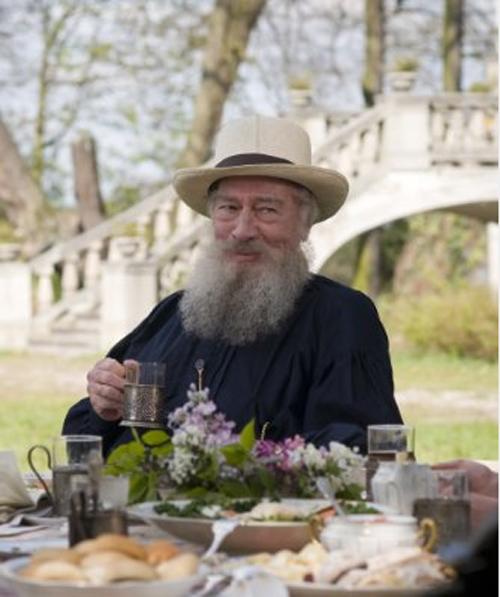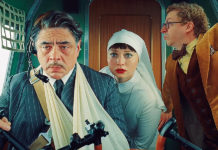The historical back-story to “The Last Station” is fascinating,
and should have made an engaging film. Thirty years before the
opening scene, Count Leo Tolstoy, respected author of the Russian
masterworks “War and Peace” and “Anna Karenina,” had a midlife
crisis, started writing prophetic, anti-Orthodox religious tracts,
and denounced fiction, private property, and sex (even in
marriage). The Tolstoyan cult was formed, with some followers and
acolytes living on a communal farm a few miles from the Count’s
manor house.
But movie audiences don’t know much of this history, nor do they
know the earlier tale of wealthy, 34-year-old Russian aristocrat
who pursued, won and wed the virginal 18-year-old physician’s
daughter who quickly bore him thirteen children. They hear fleeting
references to these events, but know more about the journal the
Count kept of his premarital love affairs and how he shared this
diary with his bride on their honeymoon and still rereads it in
private to rekindle fond memories.
For we don’t meet the Count Leo (Christopher Plummer) and
Countess Sofya (Helen Mirrin) until the last few months of their
47-year marriage, and then we see them through the eyes of Valentin
Bulgakov (James McAvoy) a secretary recently hired by Tolstoy’s
best friend and disciple Vladimir Chertkov (Paul Giomati). Bulgakov
is a “true believer” in the strictest interpretation of Eric
Hoffer’s concept. A virginal young man prone to fits of sneezing
when embarrassed or distraught and perfect as a spy in the Tolstoy
household. For there is a war going on in that house—a battle to
determine if Tolstoy will be seen by unborn generations as a
novelist or a prophet.
The Count and Countess in the film are like warriors who
attended the same military academy and have been friends most of
their lives, but who have been forced by circumstance to war
against each other. Countess Sofya repeatedly attempts to reach
hegemony by first plying her opponent with love and sex and when
that proves unsuccessful, quickly regrouping for hysterical frontal
assaults with smashed dinner plates, attacks through curtained
doorways, and cross-country maneuvers by train. In response, the
Count plays steadfast soldier, strutting his stuff, riding his
horse, and sending missives of peaceful co-existence while not so
secretly plotting with Chertkov to sign a will which gives the
copyrights to his ten books to the “peoples of the world.”
Director/screenwriter Michael Hoffman would have you believe
that all of these things occurred during a single summer and fall.
That’s because instead of the snow-clad Russia of “Dr. Zhivago,”
the scenery is lush and green and warm enough for men to go
bare-chested and women to feel comfortable wearing a simple
blouse.
But the facts are quite different. Despite what Tostoy wrote
(and his followers followed), the Count continued to write fiction,
kept most of his ancestral estate intact and often had sex with his
wife (and possibly some others as well). And, most importantly for
the movie, the great novelist didn’t need to scheme about a secret
will renouncing his copyrights because the will outlining this
stipulation was signed 15 years before his death. It reads, in
part:
“I request my heirs to restore to the public my rights in my old
works – ten volumes…in other words, I request them to renounce
author’s rights. I request this, but do not impose it upon them as
a testator’s wish. It would be well so to do; it would be well for
you if you acted thus. But if you do not act thus, that is your
concern; it means that you are not yet ripe for such action.”
So the reason given in the film about why the Count and Countess
fight and why Chertkov and Bulgakov scheme and spy is fabricated.
Of course, it’s not the first time a biopic has deconstructed
history, but it does make you wonder what the real story might
be.
Comments? E-mail Gil at: gi*********@*****st.net.
56.3
F
Healdsburg
July 9, 2025









